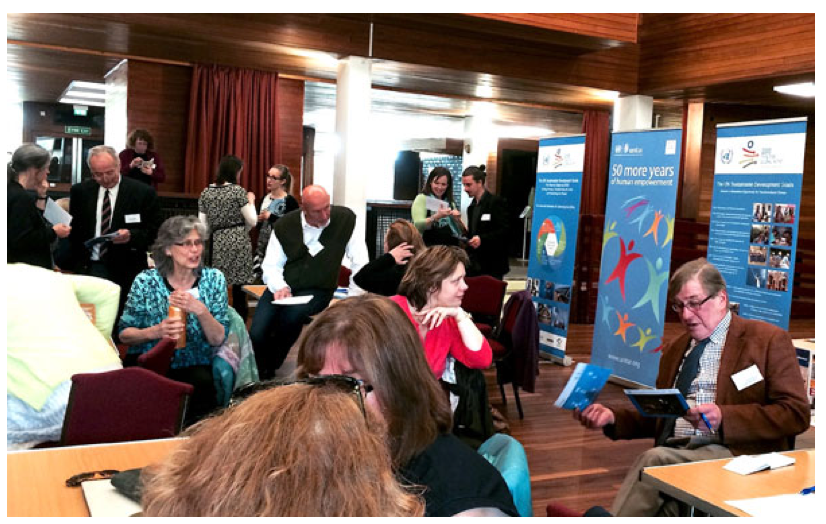The UK Government hasn’t yet involved the public or any other stakeholder in discussions about the relevance of the UN’s Sustainable Development Goals for domestic application in the UK. According to BOND’s report on Bringing the Goals Home: Implementing the SDGs in the UK, there has been some discussion across Whitehall, but the results are not publicly available. This is very different to Scotland and Wales, where there has been fairly widespread engagement, and specific commitments made by governments.

Image: UN / Cia Pak
SDG 16, which is the theme for FDSD’s Autumn 2015 Newsletter, focusses on “peace, justice and strong institutions”. It appears as though the UK Government feels this SDG, like the others, is aimed predominantly at ‘developing’ countries. But, like Sustainable Consumption and Production (SCP) (Goal 12), or reducing inequality (Goal 10), it is applicable to the UK, and in ways which may not have been appreciated.
FDSD is particularly interested in two sub-goals: 16.6 Develop effective, accountable and transparent institutions at all levels; and 16.7 Ensure responsive, inclusive, participatory and representative decision-making at all levels.
Given the current challenges to our political system, with widespread disaffection, and a reluctance to move away from centralised policy-making (despite flirtations with somewhat disconnected and limited ‘localism’), these two goals are clearly part of moving towards a more participative, and deliberative democracy. At the same time, a more open and engaged democracy can be more effective at bringing together government, business, the public and civil society, to understand and tackle complex challenges such as climate change, or excessive inequality.
Fellow Trustee Cat Tully talks in her latest Provocation about The critical role of effective, accountable and inclusive institutions in implementing the Sustainable Development Goals. Our Submission to the Environmental Audit Committee (EAC) Inquiry into “The Government’s Approach to Sustainable Development” also underlines the importance and opportunities for greater participation and accountability to achieve the SDGs and sustainable development more generally. But first, a large part of the UK, and its political representatives, need to recognize that the SDGs are actually relevant.
It’s very different in Wales and Scotland. Mind you, if you are based in England or Northern Ireland, you wouldn’t know it by reading the mainstream press which does not seem to have grasped that the SDGs might also be relevant to us. To some extent, the SDGs’ wording emphases reducing poverty in the poorest countries, and its universality, as well as appropriate targets, are either purposely or inadvertently downplayed.
But Wales, inspired by the UN’s WorldWeWant international consultation, took a bottom-up approach to see what people wanted for their future through TheWalesWeWant conversation. The recommendations became part of the Well-being and Future Generations (Wales) Act 2015 which came into force in July 2015, and whose policies, practice and monitoring stress the importance of ongoing and widespread participation of people and stakeholders (including business) to realise their objectives. It was also the first legislation to mention the SDGs, and how Wales is contributing to them.
Scotland directly addressed the relevance and implications of the SDGs through the creation of a cross-sectoral Post-2015 Working Group, with particular coordination by CIFAL Scotland and NIDOS. It continues to arrange, events and workshops around Scotland to raise awareness of the goals, discuss priorities and explore what might be possible to address them, for example, by engaging the business community. Nicola Sturgeon, Scotland’s First Minister, announced that Scotland would sign the goals back in July 2015, and is committed to their adoption both at home and abroad. She cited their compatibility with Scotland’s National Performance Framework, which among other things is focused on tackling inequality.
As we noted in our EAC Submission, the UK Government is already committed to transparency and engagement. It is an active participant in the international Open Government Partnership and the Cabinet Office is leading on Open Policy Making.
The SDGs provide a renewed impetus and necessary excuse to get moving on addressing sustainable development challenges. SDG 16 provides the means to do it effectively, transparently and accountably. The challenge is there for Westminster to catch up with the rest of the UK, start the conversation, and bring people together to make things happen – or else for local authorities, business and civil society to do it themselves.

